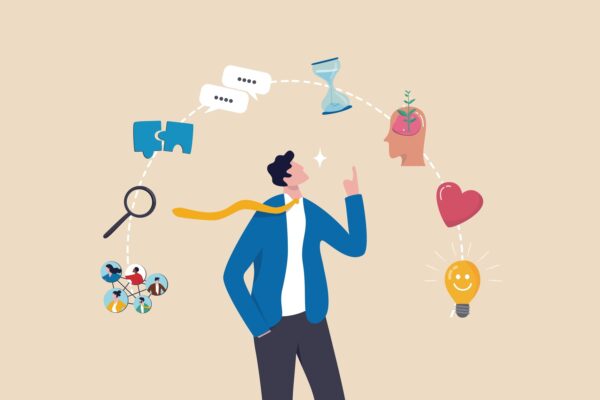“Awareness is king. We must have knowledge of what stage we are in to move to the next stage.” –Daryl Wizelman
Noel Burch, with Gordon Training International, developed the Conscious Competence Ladder in the 1970s. It’s a tool to help us understand our thoughts and emotions during the sometimes dispiriting learning process.
The model highlights two factors that affect our thinking as we learn a new skill: consciousness (awareness) and skill level (competence).
There are several valuable uses in understanding and mastering this model. It can be used to understand the emotions you will experience during the learning process, which can be useful in coaching and training situations because it allows you to stay in touch with what your people are thinking and feeling.
The journey from not knowing to mastering a competence is detailed in four steps.

STAGE 1. UNCONSCIOUS INCOMPETENCE:
We don’t know that we don’t have this skill or that we need to learn it.
- You don’t know that you don’t know.
- You are unaware of your weaknesses.
- You are disconnected and unfocused.
- You lack the skills, knowledge, and capacity to do a certain skill with excellence.
- Ignorance is bliss.
- The least stressful of the four stages. This stage can linger for years.
- Example: A child being told to color between the lines.
- To coach: Terminate this person or give them a short leash.

STAGE 2. CONSCIOUS INCOMPETENCE:
You know you don’t know.
- You are aware of your weaknesses.
- You are aware that you have not mastered your strengths.
- Improvement requires thinking and a plan to improve to conscious competence.
- This is a dark stage that can lead to depression.
- It can be painful to realize that there is so much knowledge out there that you aren’t using.
- Be careful not to get stuck here. One step at a time.
- To coach: Help them create a self-development plan. Encourage, encourage, encourage.
STAGE 3. CONSCIOUS COMPETENCE:
You know you know.
- You are good at something and you know it.
- You are aware of your strengths.
- You have mastered your strengths.
- This requires thinking, focus, and practice.
- This requires dedication and a consistent conscious effort to continue to improve.
- Become accountable to a coach, boss, or other.
- To coach: Refinement and continued encouragement (“You can do better”). Move to unconscious competence. Practice, practice, practice. Remember: They need accountability.

STAGE 4. UNCONSCIOUS COMPETENCE:
You don’t know you know.
- You succeed without focus or thought.
- You perform effortlessly at a master level.
- Commonly referred to as being in “the zone.”
- Examples include: brushing your teeth and tying your shoes. On another level: Michael Jordan and/or Tiger Woods.
- To coach: Love, serve, support, a lot of affirmation.
FINAL THOUGHTS
Learning and mastering a new skill is challenging. However it can be done with a plan and consistent practice. By acknowledging the states of competence, especially the one(s) you are in, you can perfect a certain activity after a few training sessions. Create and maintain a life plan and business vision. Be abundant. Share what you know. With an abundant mindset you will never need another “script” again. Care, give. Care, give. Care, give.
Daryl Wizelman is a dynamic originator-focused senior mortgage banking executive whose background reflects over 34yrs of standout business leadership. His passion, direction & vision have been a transformative force at each of the organizations where he has served. At Cross Country Mortgage, he leads, manages and recruits loan originators and support staff.














































